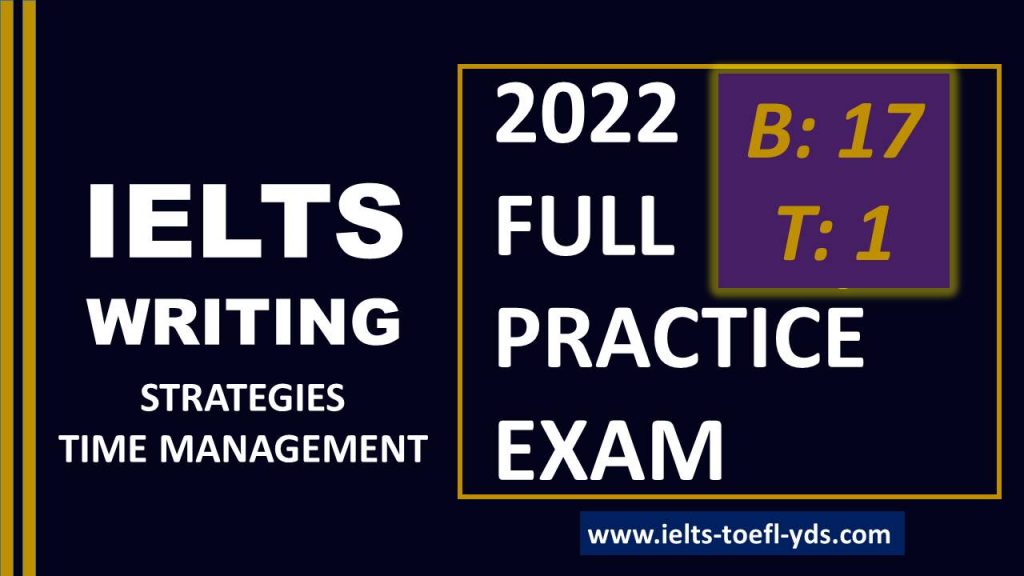IELTS WRITING FULL PRACTICE TEST WITH TIME MANAGEMENT AND TIPS AND TACTICS

Strategies and Hints for IELTS Writing
***Grammar Hints
Grammar is the conventions of presenting language and is an aid to communication. Grammar is one of the tools of language but is not the purpose, which is to communicate well. The aim of all IELTS students should be to use the conventions of the language that are used by native speakers. Native speakers in all languages express ideas in the simplest way possible and students should do the same. Keeping language as simple as possible aids communication and helps avoid confusion. Using unnecessarily complex grammar can confuse native speakers because it is not standard language. This is particularly true if the vocabulary used is not precise. If a student confuses the examiner, it will have a significant impact on their score.
Tip: Keep grammatical structures as simple as possible
- Use passive forms
In formal writing such as an IELTS examination it is almost always best to use passive forms. The over use of first person makes essays seem informal and is a style that is most commonly adopted by children. It is acceptable to use the first person, but it should be understood that using the first person is a literary device designed to draw the reader closer to the writer. If first person is used, it should be used rarely.
For example:
The environment is very important to us because it provides many of the things that we need.
Should be: The environment is very important because it provides many necessities. - Use plural forms
In academic essays (Task 2) students will usually be writing about general ideas and therefore plural forms without an article (no “the”) should be used.
For example:
In many cities around the world traffic jams present major problems to commuters.
It should be noted that each of “traffic jams”, “major problems” and
“commuters” are plural and none have “the” (an article) in front of them. - Use simple past and present tenses
In IELTS Task 1 writing students are usually required to either describe events that have occurred in the past (General) or historical data (Academic). For this
reason simple past is almost always the correct tense in Task 1 writing. In the simple past tense (often the “-ed” form) should be used for the main verb.
For example:
In the 1940’s in the UK only 8% of students attended university.
Task 2 essays are usually concerned with current issues. The subjects areevents that were occurring in the past, are occurring now and are likely to continue to occur in the future.
If the event is continuing use the present form for the main verb.
For example:
In most Western countries students expect that they will have the opportunityto attend university.
For secondary verbs the infinitive (“to attend”) or gerund (“-ing”) form
(“attending”) should generally be used. A common mistake that students make
is to confuse the two forms and add “to” in front of the “–ing” form of the verb.
***Vocabulary
Vocabulary is a very important part of IELTS writing but students generally do not understand what constitutes good vocabulary. Precise vocabulary rather than the use of rarely used words is good vocabulary. Good vocabulary use occurs when students express ideas precisely and in a standard way (similar to an educated native speaker), which means using standard phrases and
collocations (words that are used together e.g. “wise choices”, “unreasonable demands”, “alcohol consumption”, etc.). By using standard vocabulary students essays can be more easily understood by the reader, show that they understand how language is used correctly and allow the writer’s meaning to be communicated effectively. Vocabulary is assessed based on how words are
used rather than what words are used.
However, excellent vocabulary use is often incorrectly understood by students to mean writing essays that have many complex words. Very often students attempt to impress examiners by using complex words and the result is almost always that instead of using a simple correct word they use a complex word incorrectly. They show the examiner that they do not fully understand the
words that they are using. Furthermore, no two words in any language have
exactly the same meaning (if they did, one of the words would quickly fall into disuse), and changing a choice of vocabulary always means that the meaning of the sentence has also been changed.
Tip: Use vocabulary that is natural. Do not “upgrade”
